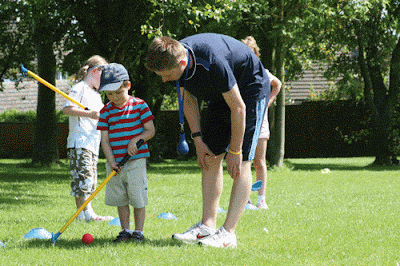Children today face far more alternatives to playing outdoors than we ever did as children. It has been well documented that the number of hours children spend playing computer games and watching television has rapidly increased from just ten years ago. Children between the ages of eleven and fifteen now spend more than 55% of their waking lives in front of televisions and computers, and half of three year olds have a television in their bedroom (The Telegraph, Feb ‘08). Whilst this development may give parents a useful outlet to get some well earned peace it is also storing up problems for children’s physical, social and emotional growth and development.
The big question is how to entice our children out of their rooms and into the parks and outdoor spaces that become even more useful as summer approaches. The best way to do this is for parents to get involved themselves, introducing your child to the outdoors from as early an age as possible. Children who grow up walking and playing in parks, woodland and our beautiful National Parks are far more likely to continue doing so as they get older. Added benefits of outdoor play include getting more vitamin D (a lack of which is currently causing the alarming return of the bone disease rickets) and that children tire themselves out and sleep better at night (The Chartered Society of Physiotherapy). Surely reason enough for parents to get their trainers on!
In this era of frenzied media coverage of child related crimes, parents have become more nervous about letting their children play out in the way we would have done as children. However, with a small number of precautions and parent participation, this perceived risk can be lowered, allowing children to be more active and develop their social skills. These perceived risks can be reduced by parents taking turns to supervise a local group of children, attending group activities at a secure location such as a tennis club or leisure centre, or putting your child on one of many locally available holiday activity camps.
Structured sport is also on the wane, especially among the traditional team sports such as football and rugby. The reasons for this are numerous and relate to some of the issues discussed above. A typical problem occurs with many children feeling disheartened where they don’t make the school football or netball team. The danger here being that they come to associate sport negatively and this mind-set becomes more entrenched, as they get older. In this scenario it is up to parents and schools to develop alternative play and sport options.
Many schools offer a wide variety of after school clubs, ranging from fencing to street dance. Such clubs offer children a route back to sporting enjoyment and may help them discover talents they weren’t previously aware of.
Where lengthy direct involvement is difficult due to busy work schedules, there are a number of alternatives available. Schools and local authorities offer a wide variety of sports and activities which children can benefit from hugely. All that is required is a small time commitment from parents. The results will mean healthier children, who gain vital experience of how to interact with others and learn the vital lessons that both winning and losing
can provide.
As the London Olympic Games approach in 2012, we face a great opportunity to re-engage our children with sport and play. Children can learn that sport isn’t just running around chasing a ball in the cold and the mud. The full array of sports will be on show for all to see. It is up to us as parents to give our children the opportunity to try new sports and get active, the benefits of which will continue to be felt throughout their young lives and into adulthood.
Mathew Burns, Sports Xtra
07545 568804 matt.burns@sports-xtra.com


No comments:
Post a Comment